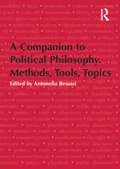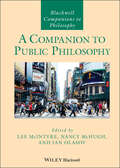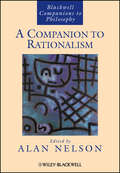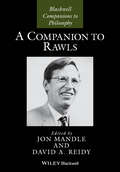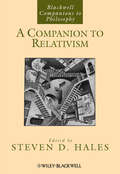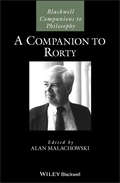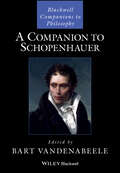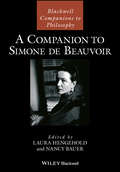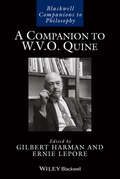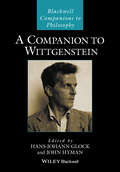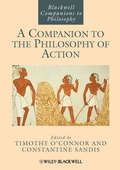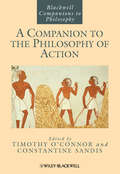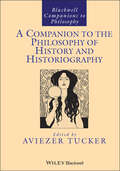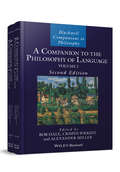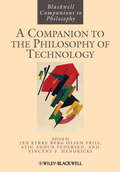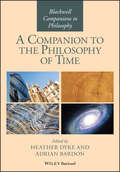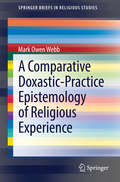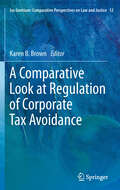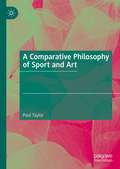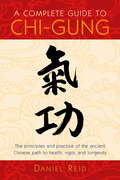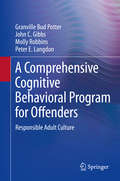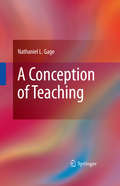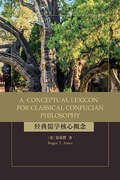- Table View
- List View
A Companion to Political Philosophy. Methods, Tools, Topics
by Antonella BesussiThis book offers a comprehensive overview of the key concepts and issues of contemporary political philosophy, providing an essential reference work for scholars and advanced students. It is structured in three parts, covering methodological issues; tools and argumentative strategies employed by political philosophy; and concepts and topics key to the discipline. Expert authors from around the world have written twenty chapters in a consistent and engaging style. Each chapter is thoroughly cross-referenced allowing students to appreciate how methodological issues relate to each other, and how methodology and argumentative tools affect the way substantial issues are addressed. The chapters are supplemented by further reading lists and selected bibliographies to aid further research. The companion will be required reading for masters and post-doctoral students, providing them with the appropriate tools for approaching political philosophy in a more thoughtful way, and showing how substantive topics are addressed within different perspectives and paradigms. The companion also provides upper-level undergraduates with a sophisticated introduction to the relevant problems and challenges political philosophy addresses.
A Companion to Public Philosophy (Blackwell Companions to Philosophy)
by Lee McIntyre Ian Olasov Nancy McHughThe first anthology devoted to the theory and practice of all forms of public philosophy A Companion to Public Philosophy brings together in a single volume the diverse practices, modalities, and perspectives of this rapidly growing field. Forty-two chapters written by established practitioners and newer voices alike consider questions ranging from the definition of public philosophy to the value of public philosophy to both society and philosophy itself. Throughout the book, philosophers offer insights into the different publics they have engaged, the topics they have explored, the methods they have used and the lessons they have learned from these engagements. The Companion explores important philosophical issues concerning the practice of philosophy in the public sphere, how public philosophy relates to advocacy, philosophical collaborations with political activists, locations where public philosophy can be done, and more. Many essays highlight underserved topics such as effective altruism, fat activism, trans activism, indigenous traditions, and Africana philosophy, while other essays set the stage for rigorous debates about the boundaries of public philosophy and its value as a legitimate way to do philosophy. Discusses the range of approaches that professional philosophers can use to engage with non-academic audiences Explores the history and impact of public philosophy from the time of Socrates to the modern era Highlights the work of public philosophers concerning issues of equity, social justice, environmentalism, and medical ethics Covers the modalities used by contemporary public philosophers, including film and television, podcasting, internet memes, and community-engaged teaching Includes essays by those who bring philosophy to corporations, government policy, consulting, American prisons, and activist groups across the political spectrumA Companion to Public Philosophy is essential reading for philosophers from all walks of life who are invested in and curious about the ways that philosophy can impact the public and how the public can impact philosophy. It is also an excellent text for undergraduate and graduate courses on the theory and practice of public philosophy as well as broader courses on philosophy, normative ethics, and comparative and world philosophy.
A Companion to Rationalism (Blackwell Companions to Philosophy #38)
by Alan NelsonThis book is a wide-ranging examination of rationalist thought in philosophy from ancient times to the present day. Written by a superbly qualified cast of philosophers Critically analyses the concept of rationalism Focuses principally on the golden age of rationalism in the seventeenth and early eighteenth centuries Also covers ancient rationalism, nineteenth-century rationalism, and rationalist themes in recent thought Organised chronologically Various philosophical methods and viewpoints are represented
A Companion to Rawls (Blackwell Companions to Philosophy)
by Jon Mandle David A. ReidyWide ranging and up to date, this is the single most comprehensive treatment of the most influential political philosopher of the 20th century, John Rawls. An unprecedented survey that reflects the surge of Rawls scholarship since his death, and the lively debates that have emerged from his work Features an outstanding list of contributors, including senior as well as “next generation” Rawls scholars Provides careful, textually informed exegesis and well-developed critical commentary across all areas of his work, including non-Rawlsian perspectives Includes discussion of new material, covering Rawls’s work from the newly published undergraduate thesis to the final writings on public reason and the law of peoples Covers Rawls’s moral and political philosophy, his distinctive methodological commitments, and his relationships to the history of moral and political philosophy and to jurisprudence and the social sciences Includes discussion of his monumental 1971 book, A Theory of Justice, which is often credited as having revitalized political philosophy
A Companion to Relativism (Blackwell Companions To Philosophy Ser. #110)
by Steven D. HalesA Companion to Relativism presents original contributions from leading scholars that address the latest thinking on the role of relativism in the philosophy of language, epistemology, ethics, philosophy of science, logic, and metaphysics. Features original contributions from many of the leading figures working on various aspects of relativism Presents a substantial, broad range of current thinking about relativism Addresses relativism from many of the major subfields of philosophy, including philosophy of language, epistemology, ethics, philosophy of science, logic, and metaphysics
A Companion to Rorty (Blackwell Companions to Philosophy)
by Alan MalachowskiA groundbreaking reference work on the revolutionary philosophy and intellectual legacy of Richard Rorty A provocative and often controversial thinker, Richard Rorty and his ideas have been the subject of renewed interest to philosophers working in epistemology, metaphysics, analytic philosophy, and the history of philosophy. Having called for philosophers to abandon representationalist accounts of knowledge and language, Rorty introduced radical and challenging concepts to modern philosophy, generating divisive debate through the new form of American pragmatism which he advocated and the renunciation of traditional epistemology which he espoused. However, while Rorty has been one of the most widely-discussed figures in modern philosophy, few volumes have dealt directly with the expansive reach of his thought or its implications for the fields of philosophy in which he worked. The Blackwell Companion to Rorty is a collection of essays by prominent scholars which provide close, and long-overdue, examination of Rorty’s groundbreaking work. Divided into five parts, this volumecovers the major intellectual movements of Rorty’s career from his early work on consciousness and transcendental arguments, to the lasting impacts of his major writings, to his approach to pragmatism and his controversial appropriations from other philosophers, and finally to his later work in culture, politics, and ethics. Offers a comprehensive, balanced, and insightful account of Rorty's approach to philosophy Provides an assessment of Rorty’s more controversial thoughts and his standing as an “anti-philosopher’s philosopher” Contains new and original exploration of Rorty’s thinking from leading scholars and philosophers Includes new perspectives on topics such as Rorty's influence in Central Europe Despite the relevance of Rorty’s work for the wider community of philosophers and for those working in fields such as international relations, legal and political theory, sociology, and feminist studies, the secondary literature surrounding Rorty’s work and legacy is limited. A Companion to Rorty address this absence, providinga comprehensive resource for philosophers and general readers.
A Companion to Schopenhauer (Blackwell Companions to Philosophy #123)
by Bart VandenabeeleA Companion to Schopenhauer provides a comprehensive guide to all the important facets of Schopenhauer’s philosophy. The volume contains 26 newly commissioned essays by prominent Schopenhauer scholars working in the field today. A thoroughly comprehensive guide to the life, work, and thought of Arthur Schopenhauer Demonstrates the range of Schopenhauer’s work and illuminates the debates it has generated 26 newly commissioned essays by some of the most prominent Schopenhauer scholars working today reflect the very latest trends in Schopenhauer scholarship Covers the full range of historical and philosophical perspectives on Schopenhauer’s work Discusses his seminal contributions to our understanding of knowledge, perception, morality, science, logic and mathematics, Platonic Ideas, the unconscious, aesthetic experience, art, colours, sexuality, will, compassion, pessimism, tragedy, pleasure, and happiness
A Companion to Simone de Beauvoir
by Nancy Bauer Laura HengeholdThe work of Simone de Beauvoir has endured and flowered in the last two decades, thanks primarily to the lasting influence of The Second Sex on the rise of academic discussions of gender, sexuality, and old age. Now, in this new Companion dedicated to her life and writings, an international assembly of prominent scholars, essayists, and leading interpreters reflect upon the range of Beauvoir’s contribution to philosophy as one of the great authors, thinkers, and public intellectuals of the twentieth century. The Companion examines Beauvoir’s rich intellectual life from a variety of angles—including literary, historical, and anthropological perspectives—and situates her in relation to her forbears and contemporaries in the philosophical canon. Essays in each of four thematic sections reveal the breadth and acuity of her insight, from the significance of The Second Sex and her work on the metaphysics of gender to her plentiful contributions in ethics and political philosophy. Later chapters trace the relationship between Beauvoir’s philosophical and literary work and open up her scholarship to global issues, questions of race, and the legacy of colonialism and sexism. The volume concludes by considering her impact on contemporary feminist thought writ large, and features pioneering work from a new generation of Beauvoir scholars. Ambitious and unprecedented in scope, A Companion to Simone de Beauvoir is an accessible and interdisciplinary resource for students, teachers, and researchers across the humanities and social sciences.
A Companion to Spinoza (Blackwell Companions to Philosophy)
by Yitzhak Y. MelamedAn unparalleled collection of original essays on Benedict de Spinoza's contributions to philosophy and his enduring legacy A Companion to Spinoza presents a panoramic view of contemporary Spinoza studies in Europe and across the Anglo-American world. Designed to stimulate fresh dialogue between the analytic and continental traditions in philosophy, this extraordinary volume brings together 53 original essays that explore Spinoza’s contributions to Western philosophy and intellectual history. A diverse team of established and emerging international scholars discuss new themes and classic topics to provide a uniquely comprehensive picture of one of the most influential metaphysicians of all time. Rather than simply summarizing the body of existing scholarship, the Companion develops new ideas, examines cutting-edge scholarship, and suggests directions for future research. The text is structured around six thematically-organized sections, exploring Spinoza’s life and background, his contributions to metaphysics and natural philosophy, his epistemology, politics, ethics, and aesthetics, the reception of Spinoza in the work of philosophers such as Kant, Schelling, Schopenhauer, and Hegel, and more. This unparalleled research collection combines a timely overview of the current state of research with deep coverage of Spinoza’s philosophy, legacy, and influence. Part of the celebrated Blackwell Companions to Philosophy series, A Companion to Spinoza is an ideal text for advanced courses in modern philosophy, intellectual history, and the history of metaphysics, and an indispensable reference for researchers and scholars in Spinoza studies.
A Companion to W. V. O. Quine (Blackwell Companions to Philosophy)
by Gilbert Harman Ernie LeporeThis Companion brings together a team of leading figures in contemporary philosophy to provide an in-depth exposition and analysis of Quine’s extensive influence across philosophy’s many subfields, highlighting the breadth of his work, and revealing his continued significance today. Provides an in-depth account and analysis of W.V.O. Quine’s contribution to American Philosophy, and his position as one of the late twentieth-century’s most influential analytic philosophers Brings together newly-commissioned essays by leading figures within contemporary philosophy Covers Quine’s work across philosophy of logic, philosophy of language, ontology and metaphysics, epistemology, and more Explores his work in relation to the origins of analytic philosophy in America, and to the history of philosophy more broadly Highlights the breadth of Quine’s work across the discipline, and demonstrates the continuing influence of his work within the philosophical community
A Companion to Wittgenstein
by Hans-Johann Glock John HymanThe most comprehensive survey of Wittgenstein’s thought yet compiled, this volume of fifty newly commissioned essays by leading interpreters of his philosophy is a keynote addition to the Blackwell series on the world’s great philosophers, covering everything from Wittgenstein’s intellectual development to the latest interpretations of his hugely influential ideas. The lucid, engaging commentary also reviews Wittgenstein’s historical legacy and his continued impact on contemporary philosophical debate.
A Companion to the Philosophy of Action
by Timothy O'Connor Constantine SandisA Companion to the Philosophy of Action offers a comprehensive overview of the issues and problems central to the philosophy of action. The first volume to survey the entire field of philosophy of action (the central issues and processes relating to human actions) Brings together specially commissioned chapters from international experts Discusses a range of ideas and doctrines, including rationality, free will and determinism, virtuous action, criminal responsibility, Attribution Theory, and rational agency in evolutionary perspective Individual chapters also cover prominent historic figures from Plato to Ricoeur Can be approached as a complete narrative, but also serves as a work of reference Offers rich insights into an area of philosophical thought that has attracted thinkers since the time of the ancient Greeks
A Companion to the Philosophy of Action (Blackwell Companions To Philosophy Ser.)
by Timothy O'Connor Constantine SandisA Companion to the Philosophy of Action offers a comprehensive overview of the issues and problems central to the philosophy of action. The first volume to survey the entire field of philosophy of action (the central issues and processes relating to human actions) Brings together specially commissioned chapters from international experts Discusses a range of ideas and doctrines, including rationality, free will and determinism, virtuous action, criminal responsibility, Attribution Theory, and rational agency in evolutionary perspective Individual chapters also cover prominent historic figures from Plato to Ricoeur Can be approached as a complete narrative, but also serves as a work of reference Offers rich insights into an area of philosophical thought that has attracted thinkers since the time of the ancient Greeks
A Companion to the Philosophy of History and Historiography (Blackwell Companions to Philosophy #107)
by Aviezer TuckerThe fifty entries in this Companion cover the main issues in the philosophies of historiography and history, including natural history and the practices of historians. Written by an international and multi-disciplinary group of experts A cutting-edge updated picture of current research in the field Part of the renowned Blackwell Companions series
A Companion to the Philosophy of Language (Blackwell Companions to Philosophy #1)
by Alexander Miller Bob Hale Crispin Wright“Providing up-to-date, in-depth coverage of the central question, and written and edited by some of the foremost practitioners in the field, this timely new edition will no doubt be a go-to reference for anyone with a serious interest in the philosophy of language.” Kathrin Glüer-Pagin, Stockholm University Now published in two volumes, the second edition of the best-selling Companion to the Philosophy of Language provides a complete survey of contemporary philosophy of language. The Companion has been greatly extended and now includes a monumental 17 new essays – with topics chosen by the editors, who curated suggestions from current contributors – and almost all of the 25 original chapters have been updated to take account of recent developments in the field. In addition to providing a synoptic view of the key issues, figures, concepts, and debates, each essay introduces new and original contributions to ongoing debates, as well as addressing a number of new areas of interest, including two-dimensional semantics, modality and epistemic modals, and semantic relationism. The extended “state-of-the-art” chapter format allows the authors, all of whom are internationally eminent scholars in the field, to incorporate original research to a far greater degree than competitor volumes. Unrivaled in scope, this volume represents the best contemporary critical thinking relating to the philosophy of language.
A Companion to the Philosophy of Technology
by Vincent F. Hendricks Jan Kyrre Olsen Stig Andur PedersenDrawing on essays from leading international and multi-disciplinary scholars, A Companion to the Philosophy of Technology is the first comprehensive and authoritative reference source to cover the key issues of technology's impact on society and our lives.Presents the first complete, authoritative reference work in the fieldOrganized thematically for use both as a full introduction to the field or an encyclopedic referenceDraws on original essays from leading interdisciplinary scholarsFeatures the most up-to-date and cutting edge research in the interdisciplinary fields of philosophy, technology, and their broader intellectual environments
A Companion to the Philosophy of Technology (Blackwell Companions to Philosophy #78)
by Vincent F. Hendricks Jan Kyrre Olsen Stig Andur PedersenDrawing on essays from leading international and multi-disciplinary scholars, A Companion to the Philosophy of Technology is the first comprehensive and authoritative reference source to cover the key issues of technology’s impact on society and our lives. Presents the first complete, authoritative reference work in the field Organized thematically for use both as a full introduction to the field or an encyclopedic reference Draws on original essays from leading interdisciplinary scholars Features the most up-to-date and cutting edge research in the interdisciplinary fields of philosophy, technology, and their broader intellectual environments
A Companion to the Philosophy of Time
by Heather Dyke Adrian BardonA Companion to the Philosophy of Time presents the broadest treatment of this subject yet; 32 specially commissioned articles - written by an international line-up of experts - provide an unparalleled reference work for students and specialists alike in this exciting field.The most comprehensive reference work on the philosophy of time currently availableThe first collection to tackle the historical development of the philosophy of time in addition to covering contemporary workProvides a tripartite approach in its organization, covering history of the philosophy of time, time as a feature of the physical world, and time as a feature of experienceIncludes contributions from both distinguished, well-established scholars and rising stars in the field
A Comparative Doxastic-Practice Epistemology of Religious Experience (SpringerBriefs in Religious Studies #2)
by Mark Owen WebbThis book takes a theoretical enterprise in Christian philosophy of religion and applies it to Buddhism, thus defending Buddhism and presenting it favorably in comparison. Chapters explore how the claims of both Christianity and Theravada Buddhism rest on people's experiences, so the question as to which claimants to religious knowledge are right rests on the evidential value of those experiences. The book examines mysticism and ways to understand what goes on in religious experiences, helping us to understand whether it is good grounds for religious belief. The author argues that religious language in both Christian and Buddhist traditions is intelligible as factual discourse, and so reports of mystical experience are true or false. The book contends that those experiences can be fruitfully thought of as perceptual in kind and that they are therefore good prima facie grounds for religious belief, in the absence of defeating conditions. The work goes on to explore Christian and Buddhist testimony and how the likelihood of self-deception, self-delusion, imaginative elaboration and the like constitutes a defeating condition. It is shown that this defeater has less scope for operation in the Buddhist case than in the Christian case, and therefore Theravada Buddhism is better grounded. This work will appeal to students and scholars of philosophy and philosophy of religion, and those interested in the study of religious experience.
A Comparative Look at Regulation of Corporate Tax Avoidance (Ius Gentium: Comparative Perspectives on Law and Justice #12)
by Karen B. BrownThis volume provides a fascinating look at the anti-tax avoidance strategies employed by more than fifteen countries in eastern and western Europe, Canada, the Pacific Rim, Asia, Africa, and the United States. It surveys the similarities and differences in anti-avoidance regimes and contains detailed chapters for each country surveying the moral and legal dimensions of the problem. The proliferation of tax avoidance schemes in recent years signals the global dimensions of a problem presenting a serious challenge to the effective administration of tax laws. Tax avoidance involves unacceptable manipulation of the law to obtain a tax advantage. These transactions support wasteful behavior in which corporations enter into elaborate, circuitous arrangements solely to minimize tax liability. It frustrates the ability of governments to collect sufficient revenue to provide essential public goods and services. Avoidance of duly enacted provisions (or manipulation to secure tax benefits unintended by the legislature) poses a threat to the effective operation of a free society for the benefit of a small group of members who seek the privilege of shifting their tax burden onto others merely to compete in the world of commerce. In a world in which world treasuries struggle for the resources to battle terrorist threats and to secure a decent standard of living for constituents tax avoidance can bring economies close to the edge of sustainability. As tax avoidance is one of the top concerns of most nations, the importance of this work cannot be overstated.
A Comparative Philosophy of Sport and Art
by Paul TaylorThis book compares two major leisure activities – watching sport and engaging with art. It explores a range of philosophical questions that arise when sport and art are placed side by side:The works of Shakespeare, Rembrandt and Mozart have continued to fill playhouses, galleries and concert halls for centuries since they were created, while our interest in even the most epic sporting contests fades after just a few years, or even a single season. What explains this difference?Sporting contests are merely games. So why do sports fans attach such great importance to whether their team wins or loses?Do sporting contests have meaning in the way works of art do?Beauty is a central value in art. Is it important in sport?What role does morality play in sport and art?What value do sport and art contribute to the world and to the meaning of people’s lives?
A Complete Guide to Chi-Gung
by Daniel ReidChi-gung, which literally means "energy work," is a system of cultivating health, vitality, and longevity that is based on the fundamental principles of Taoism and the laws of nature. Practiced by the Chinese for thousands of years, chi-gung works with the energy found in all living things to help rid the body of the imbalances that sap our strength and give rise to disease. The simple, meditative movements, breathing exercises, and massage techniques that are the basis of chi-gung can be practiced by anyone, regardless of age or physical fitness.
A Comprehensive Cognitive Behavioral Program for Offenders: Responsible Adult Culture
by John C. Gibbs Granville Bud Potter Molly Robbins Peter E. LangdonThis book presents Responsible Adult Culture (RAC), a truly comprehensive program for helping offenders to think and act responsibly. It provides the tools of the program with great clarity. In addition to exploring the needs of all offenders, the book addresses the special needs of both female and dual-diagnosis offenders. Responsible thinking means habitually seeing others and situations accurately, rather than in self-serving and egocentrically distorted ways. Because self-centered thinking is typically reinforced by negative group norms, RAC starts with the cultivation of a constructive climate ("mutual help" groups) to motivate change. Motivated group members then gain tools for responsible thinking through "equipment" (cognitive behavioral) meetings. These tools pertain to social skills, anger management, and the correction of self-centered thinking through social perspective taking (cognitive restructuring). Beyond documented reductions in distorted thinking and recidivism rates, RAC's synergy or round-the-clock interpenetration of positive groups and tools promotes a safer and more humane institutional culture.
A Conception of Teaching
by Nathaniel L. GageThe literature of the behavioural and social sciences is full of theory and research on learning and memory. Teaching is comparatively a stepchild, neglected by those who have built a formidable body of theories of learning and memory. However, teaching is where learning and memory theory should pay off. "A Conception of Teaching" dedicates a chapter to each of the following important components: the need for a theory; the possibility of a theory; the evolution of a paradigm for the study of teaching; a conception of the process of teaching; a conception of the content of teaching; a conception of students' cognitive capabilities and motivations; a conception of classroom management; and the integration of these conceptions. Written in a highly accessible style, while maintaining a base in research, Dr. Nathaniel L. Gage presents "A Conception of Teaching" with clarity and well situated within current educational debates.
A Conceptual Lexicon for Classical Confucian Philosophy (SUNY series in Chinese Philosophy and Culture)
by Roger T. AmesUses a comparative hermeneutical method to explain the most important terms in the classical Confucian philosophical texts, in an effort to allow the tradition to speak on its own terms.Over the years, Roger T. Ames and his collaborators have consistently argued for a processual understanding of Chinese natural cosmology made explicit in the Book of Changes. It is this way of thinking, captured in its own interpretive context with the expression "continuities in change" (biantong) that has shaped the grammar of the Chinese language and informs the key philosophical vocabulary of Confucian philosophy. Over the past several centuries of cultural encounter, the formula established by the early missionaries for the translation of classical Chinese texts into Western languages has resulted in a Christian conversion of Confucian texts that is still very much with us today. And more recently, the invention of a new Chinese language to synchronize East Asian cultures with Western modernity has become another obstacle in our reading of the Confucian canons. This volume, a companion volume to A Sourcebook in Classical Confucian Philosophy, employs a comparative hermeneutical method in an attempt to explain the Confucian terms of art and to take the Confucian tradition on its own terms.
